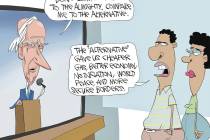Millions for smart meters
NV Energy -- the local monopoly which until recently was known as "Nevada Power" -- was awarded $138 million in federal tax money Tuesday to launch a three-year, $298 million project to replace every electric meter in Nevada with a "smart meter."
Executives say the change will give consumers more say over how much electricity they use and how much they pay for it.
NV Energy's grant was part of $3.4 billion in government "stimulus" funds given to 100 projects aimed at modernizing the nation's power grid.
The plan is for smart meters to allow the company to send detailed consumption numbers to consumers via a small display inside the home. Included would be how much you owe so far this month, what the cost of that power was per kilowatt hour, what it will be in the next hour, and perhaps even what you could save if you unplugged your plasma-screen TV and read a book, instead.
Ratepayers who notice a cheaper cost per kilowatt coming up in two hours might wait till then to run the dishwasher.
Unfortunately, Nevada regulations currently prohibit charging residential customers based on hourly costs, instead requiring blended averages. But NV Energy president and chief executive officer Michael Yackira said he expects the Public Utilities Commission to sign on to the hourly rate modification.
Allowing consumers to enjoy savings by running their washing machines at night (for example) would make sense for everyone. Of course, taxpayers will have to foot that $138 million subsidy, as well as the broader $3.4 billion federal expenditure, long before they see any benefits.
And ratepayers -- who are often the same people as taxpayers -- will also end up covering the additional $160 million NV Energy expects to plow into the project.
If the new meters are really guaranteed to save consumers money, why wouldn't the private utility simply offer to sell them to willing buyers, the same way willing buyers pay "up front" for an oil change designed to prolong the life of an engine? How did this become the responsibility of the already cash-strapped federal government?
"I'm always leery of things that require federal money," warns Ben Lieberman, senior policy analyst for energy and the environment at the Heritage Foundation. "My feeling is that the fact that these things require federal money is a red flag they might not make much sense."
Even more worrisome to Mr. Lieberman are high-tech energy systems that might let utilities stem consumers' energy use against their will -- perhaps under government orders.
"Anything that interferes with consumers' ability to use energy as they see fit could hurt in ways that don't show up in dollars and cents," Mr. Lieberman warns. "I could save you a lot of gas if I stole your car, but that wouldn't help you in the long run."
Giving the consumer more control, and allowing prices to flex based on the real, shifting costs of power at given hours? That's all to the good.
But anyone who says, "Oh, the government would never order the company to use these new meters to limit the amount of power you can buy each month," is referred (for starters) to past guarantees that the personal income tax would fall only on millionaires; that the Pure Food and Drug Act was only about truth in labeling and would never be used to tell us which drugs we can and cannot buy; and the federal promise that Daylight Savings Time was a temporary measure necessary to save coal for the war effort, guaranteed to be suspended as soon as we defeated the Hun -- not in 1945, mind you, but in 1918.























